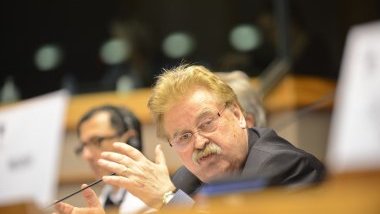Why is it any different at the EU level?
There are two main explanations for why, forty years after the first elections, very few candidates for the European Parliament are mobile, or transnational. The first clue lies in the word “transnational”. Instinctively, it’s easier to think that one will best be represented by a politician of one’s own nationality – that only a compatriot will truly understand you and your needs.
This isn’t always the case, however: a member of the Finnish Pirate Party once told me that his true representative in the European Parliament was Julia Reda, the German Pirate MEP. Given the absence of an EU-wide constituency, he, of course, didn’t have a chance to vote for her. But of the 751 MEPs, he could relate to Julia Reda the most. If I had to name my own favourite MEP, I would probably not pick a Finn either.
The language barrier is one obvious caveat, but fortunately, we’re overcoming that little by little. However, what is more difficult for a candidate than simply learning the local language is to gain a deep understanding of the local political culture and citizens’ concerns. The less a candidate understands, the bigger the likelihood of embarrassing gaffes on the campaign trail.
This takes us to the second explanation, namely the weakness of the pan-European public sphere. Hopping from one place to another gets easier as there’s more Europe-wide debate, and thereby more knowledge about public attitudes, unspoken sentiments and key controversies in different places. This won’t remove the need to know your electorate – it didn’t go down well when the former UK Independence Party leader Paul Nuttall only moved to the city of Stoke after the start of his campaign to get elected for the constituency. [1] However, European-wide debate makes the task much easier. Because there is a strong Finnish-wide public sphere, Paavo Väyrynen did not need long to settle before he was able to seek election in Southern Finland.
On the other hand, thanks to the strength of the Finnish public sphere (and the fact that Paavo Väyrynen is something of a cult figure in Finnish politics), Väyrynen was already well-known by voters in the Uusimaa constituency when he announced his candidacy. At the European level, examples of MEP candidates well-known outside their home countries are rare, but this may change with time.
From international to transnational European politics
Once the MEPs are elected, they are grouped on the basis of political ideology rather than nationality. Before the elections, however, we’re still mostly enclosed within our national boundaries – one exception is the former Finnish rally driver Ari Vatanen who was an MEP for South East France from 2004 to 2009. In the 2019 elections, some candidates and movements are breaking with this pattern more deliberately and systematically. The most prominent example is the former Greek Finance Minister Yanis Varoufakis who recently announced that he is going to run for the European Parliament in Germany, representing the new DiEM25 movement. Upon his announcement, Varoufakis said that the run “epitomises the new transnational politics we need in Europe”.
Given the euro crisis clashes over the Greek bailout programme, Varoufakis is among the better-known foreign politicians in Germany. [2] Considering the lack of an electoral threshold in the 96-member German constituency, Varoufakis stands a decent chance of getting elected. In general, DiEM25 has proclaimed that members can run in any of their national collectives regardless of nationality, though most of the transnational candidates will likely be relying on the name that the movement can make for itself, rather than individual fame.
A positive trend for Europe
Transnational candidates’ bids for election are a good thing for reasons similar to why an EU-wide constituency, or ‘transnational lists’, would make the EU work better. One assumes (though it isn’t always necessarily the case) that candidates coming from another country will have a broader perspective, and that they are less likely to slip into talking national politics instead of discussing matters covered in the European Parliament. At the same time, they will show Europeans that they can relate to and be represented by a person of a different nationality – a new way to foster European identity which, in turn, will liberate us from a host of existential anxieties in a world where Europeans are better off sticking together, whether they like it or not. Finally, these candidates help the electoral campaign to match the reality of day-to-day work inside the Parliament – to bring a transnational dimension of democracy to the campaign trail, given that it already exists inside the Parliament.
Quite logically, the majority of candidates and MEPs in a given country will continue to be born and bred locals. Six of the seven Finnish MPs for Lapland were born in Lapland. However, as European integration deepens, it’s increasingly unjustified that there is virtually no mobility whatsoever at the European level. We already commute, marry and move houses across borders, so why shouldn’t we get elected anywhere in the EU as well? We already have free movement of people – next it’s time for free movement of politicians.







Follow the comments: |
|
